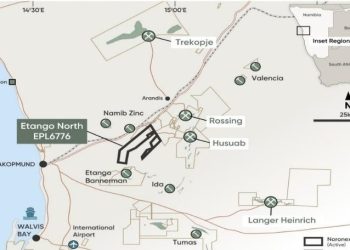
Deep Yellow Limited has selected Ausenco Services Pty Ltd (Ausenco) as the preferred contractor to provide detailed engineering and engineering, procurement and construction management (EPCM) services for the company’s flagship Tumas Project.
Deep Yellow’s Managing Director and CEO John Borshoff said an EPCM contract will be finalised after the final investment decision, scheduled for the third quarter of 2024.
In the meantime, the parties will sign a detailed engineering agreement to advance key work streams before the final investment decision and finalise a full EPCM contract.
“The company looks forward to working with Ausenco to deliver the exciting Tumas Project, which will be the company’s first mining operation and flagship development. The selection of Ausenco as the preferred EPCM Contractor for the Tumas Project is a significant project milestone,” Borshoff said.
He noted that Ausenco is a market-leading engineering firm, highly regarded within the industry for its technical ability and track record of project delivery.
“Having Ausenco on board will complement the project delivery team to add significant value to the exciting Tumas Project, in a period of extended positive outlook in the uranium supply sector,” he said.
Ausenco President Reuben Joseph stated that the company is proud to be selected as the preferred EPCM Contractor for the Tumas Project.
“From our involvement in the project since 2019, particularly the work we completed on the definitive feasibility study and subsequent December 2023 Re-Costing Addendum for Tumas, we fully understand the project’s exciting potential and Tier-1 status,” he noted.
Joseph said the company is looking forward to working with Deep Yellow and providing an extensive skill set and market-leading engineering and project delivery experience.
This comes as Deep Yellow’s Tumas project is expected to cost N$6 billion (US$360.5 million) according to re-costing study findings from N$7.3 billion (US$385.1 million) projected from the definitive feasibility study.
The re-costing study’s findings show that this will result in cost savings of N$458 million (US$24.6 million).
The study, initiated against a backdrop of inflationary and logistical challenges, proved instrumental in affirming the project’s commercial viability.
“The results provide the company with a strong platform to proceed with project financing, detailed engineering work, and maintain the timeline for the final investment decision to be made in Q3 2024,” Borshoff said.
Notable changes resulting from the re-costing study include a 6.4% reduction in the initial capital cost estimates to N$6.8 billion (US$360 million) from the January 2023 definitive feasibility study of N$7.3 billion (US$384 million).







